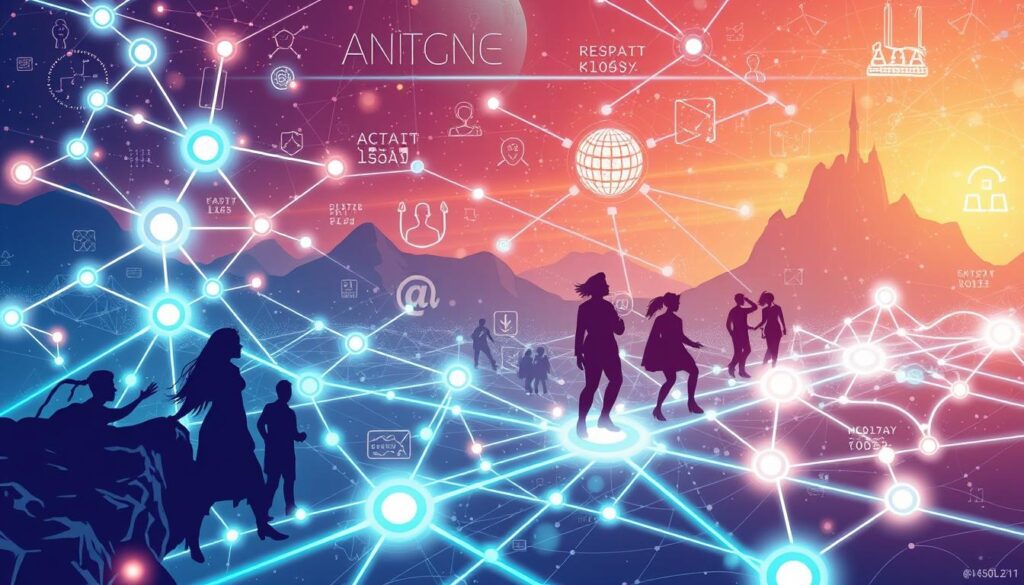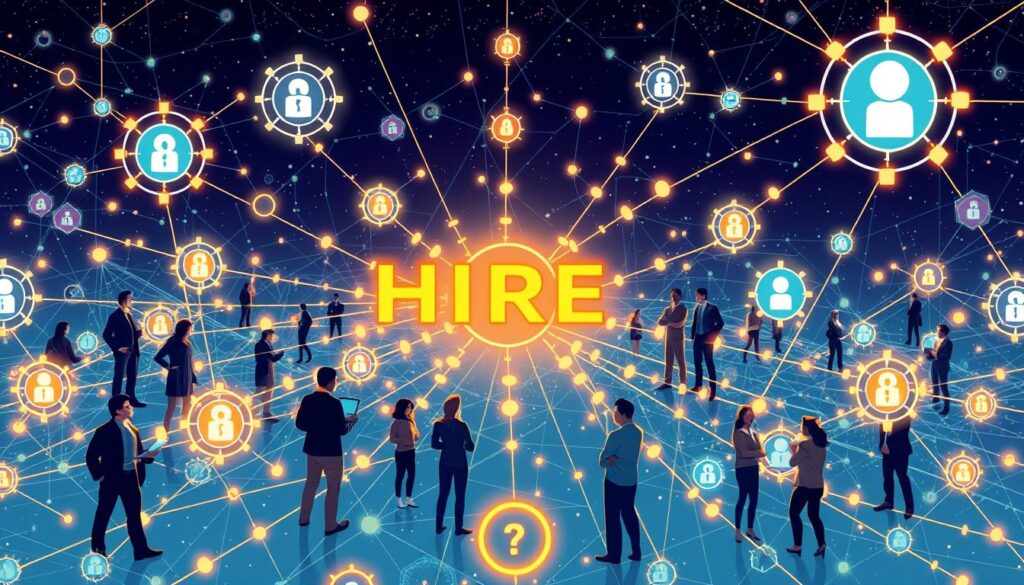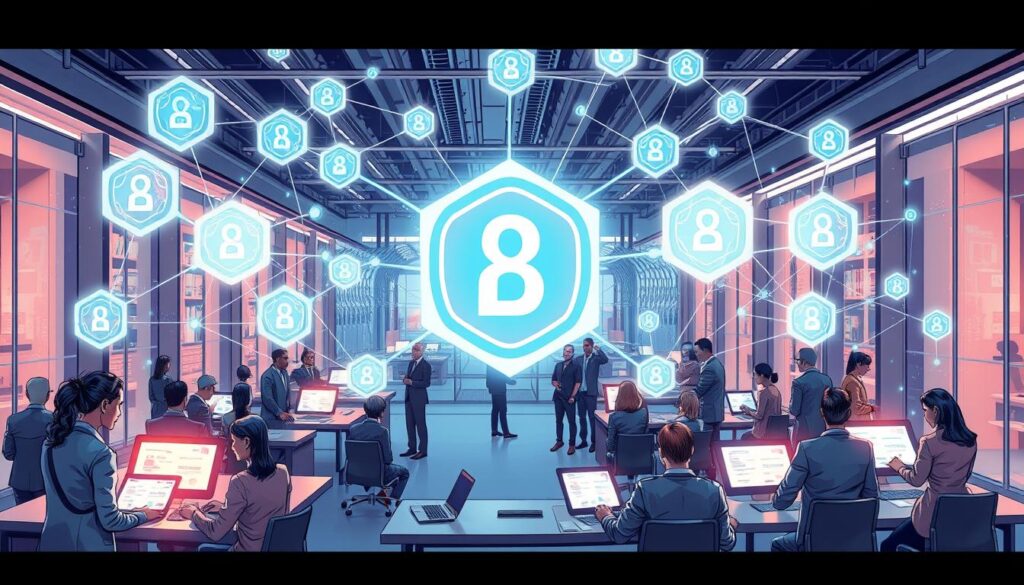In a recent survey, a remarkable 90% of businesses have integrated blockchain technology into their operations1. This cutting-edge technology presents a viable solution for modernizing the background verification process in recruitment. It streamlines the experiences of job applicants, employers, educational institutions, certification bodies, and background verification agencies. By harnessing blockchain’s capabilities, organizations can significantly enhance operational efficiency, trust, and data accuracy within their human capital management frameworks.
Blockchain technology ensures the secure and tamper-proof storage of data, effectively mitigating fraud and errors in HR management processes2. Traditional verification methods are both time-consuming and costly, with hundreds of thousands of nurses in the US facing delays of over 6 months for verification3. Blockchain-based recruitment processes, on the other hand, expedite candidate verification, substantially reducing recruitment timelines2. For instance, Dock’s blockchain technology facilitates instant verification, requiring mere seconds, as opposed to other blockchains which may take from seconds to hours3.
The integration of blockchain enhances data security, ensuring the secure storage of sensitive employee information2. Its fraud-proof nature, due to its tamper-proof characteristics, renders data manipulation and the creation of false records virtually impossible3. Blockchain technology also mitigates resume fraud through its immutable record-keeping capabilities1. Utilizing decentralized identifiers (DIDs) and Verifiable Credentials, individuals and organizations can securely manage and verify credentials3.
Despite the myriad benefits, challenges and risks associated with adoption, standardization, cost, data quality, security, and user acceptance must be addressed through ongoing research and collaboration among industry stakeholders. Factors influencing blockchain verification times include network congestion, block size, transaction complexity, and transaction fees3.
Key Takeaways
- Blockchain technology streamlines credential verification in recruitment, significantly improving efficiency and trust.
- Secure and tamper-proof data storage diminishes fraud and errors in HR management processes.
- Blockchain-based recruitment accelerates candidate verification, leading to a reduction in time-to-hire.
- Decentralized identifiers and Verifiable Credentials empower secure credential management and verification.
- Addressing challenges in adoption, standardization, cost, data quality, and security through research and collaboration is imperative.
The Promise of Blockchain Technology in HR Credential Management
Blockchain technology is transforming the landscape of HR credential verification, introducing a paradigm shift in how organizations manage their verification processes. It leverages decentralized and immutable records to streamline verification, enhance trust and transparency, and ensure data accuracy and reliability.
The global adoption of blockchain technology is witnessing a significant surge, with up to 87% of business owners indicating a likelihood to invest in blockchain within a year4. In fact, blockchain technology spending has nearly tripled in just three years4. Despite 39% of companies perceiving blockchain as overhyped, 68% acknowledge that not adopting it could compromise their competitive edge4.
Streamlining the Verification Process
Blockchain’s role in HR credential management is underscored by its capacity to streamline verification processes. By utilizing a decentralized ledger to store employee records and credentials, HR professionals can rapidly verify the authenticity of a candidate’s qualifications. This efficiency not only saves time but also diminishes the risk of fraud and errors.
Enhancing Trust and Transparency
Blockchain technology significantly enhances trust and transparency in HR credential verification. Immutable records stored on a decentralized network ensure the accuracy and reliability of data, fostering trust among employers, candidates, and educational institutions.
Ensuring Data Accuracy and Reliability
The decentralized and immutable nature of blockchain technology guarantees the security of HR data5. By utilizing a blockchain to store employee records and credentials, organizations can maintain the confidentiality, integrity, and availability of sensitive information. A survey revealed that 70% of HR professionals and IT experts believe blockchain can significantly enhance HR data security5.
| Benefit | Description |
|---|---|
| Streamlined Verification | Quick and easy verification of candidate qualifications |
| Enhanced Trust | Increased transparency and confidence in data accuracy |
| Data Security | Decentralized storage ensures confidentiality and integrity |
Despite the evident benefits of blockchain in HR credential management, challenges such as integration with existing systems and regulatory hurdles must be addressed5. Despite these obstacles, the transformative impact of blockchain on employee credential verification is undeniable.
Benefits for Candidates: Empowerment, Mobility, and Lifelong Learning
In the rapidly evolving world of work, blockchain technology is emerging as a game-changer for candidate empowerment and career mobility. By leveraging the power of decentralized and secure data storage, blockchain-based credential verification systems are transforming the way individuals manage and showcase their skills and qualifications6.

Owning Your Career Story
With blockchain-based credential verification, candidates gain unprecedented control over their professional narratives. They can store and manage their educational, certification, and employment records in a tamper-resistant digital wallet, granting or revoking access to their data as needed6. This eliminates the need for lengthy, manual verification processes, empowering candidates to own their career stories and present their qualifications with confidence.
The impact of this technology is far-reaching, with worldwide spending on blockchain across all industries projected to grow from over $4 billion in 2020 to more than $14 billion by 20237. As more institutions adopt blockchain-based solutions, candidates will enjoy streamlined verification processes and enhanced trust in their credentials.
Borderless Credentials for Global Opportunities
In an increasingly globalized job market, borderless credentials are key to unlocking new opportunities. Blockchain technology enables the creation of a universal, decentralized system for verifying qualifications, making it easier for candidates to pursue international roles6. By eliminating the need for costly and time-consuming credential evaluations, blockchain empowers job seekers to showcase their skills to employers worldwide.
Blockchain-based learning platforms are emerging to create transparent environments for education, making global accessibility to resources more affordable and contributing to the affordability of lifelong learning6. With over 738,000 unique credentials documenting learning, including degrees, certificates, digital badges, and apprenticeships7, candidates can continuously upskill and reskill, staying competitive in a rapidly changing job market.
As companies increasingly adopt blockchain technology to verify employees’ skills and qualifications6, candidates who embrace digital identity management and lifelong learning will be well-positioned to seize new opportunities and thrive in their careers. By harnessing the power of blockchain, individuals can take control of their professional journeys, breaking down barriers and unlocking their full capacity in a borderless world of work.
Advantages for Employers: Efficiency, Risk Reduction, and Compliance
Blockchain technology introduces a plethora of advantages for employers, transforming credential verification and hiring processes. Employers can access verified candidate data expediently, significantly curtailing manual verification time8. This streamlined methodology not only augments efficiency but also empowers HR professionals to concentrate on evaluating other critical aspects of a candidate’s profile.
The adoption of blockchain-based credentialing is escalating, with the global blockchain education market anticipated to reach $360.9 million by 2025, exhibiting a compound annual growth rate (CAGR) of 59.0%9. As more institutions integrate this technology, employers can anticipate a more fluid and dependable hiring process. Blockchain’s capability to diminish academic fraud by up to 75%9 and potentially decrease verification time by up to 80%9 highlights its transformative impact on HR.
The tamper-proof essence of blockchain technology instills confidence in the data, lessening the risk of hiring unqualified or fraudulent candidates. By ensuring compliance with industry regulations, employers can make informed hiring decisions, safeguarding their reputation and financial interests. Blockchain’s congruence with data privacy legislation, such as GDPR and CCPA, further accentuates its value in safeguarding sensitive candidate information8.
| Benefit | Description |
|---|---|
| Efficiency | Faster access to verified candidate data, reducing manual verification time |
| Risk Reduction | Mitigating the risk of hiring unqualified or fraudulent candidates |
| Compliance | Ensuring adherence to industry regulations and data privacy laws |
Blockchain’s applications transcend initial hiring, facilitating project assignments for existing employees by swiftly verifying their credentials and skills8. This versatility positions blockchain as a potent tool for optimizing human capital management throughout an employee’s lifecycle.
Blockchain technology is of particular significance in industries with high-stake credential verification requirements, such as healthcare or jobs on oil rigs.
As the adoption of blockchain-based credentialing continues to ascend, with over 50% of higher education institutions globally anticipated to implement this technology by 20259, employers who embrace these solutions early will gain a competitive advantage in attracting premier talent. They will also ensure a more efficient, secure, and compliant hiring process.
Fostering Trust and Transparency in the Hiring Ecosystem
The integration of blockchain technology within the hiring ecosystem is transforming the paradigm of talent acquisition and management. This innovation leverages blockchain’s decentralized and immutable properties, ensuring the authenticity of candidate credentials. Such a development eradicates fraudulent activities, significantly boosting trust within the recruitment framework10. It streamlines processes such as candidate identification, talent acquisition, and interview scheduling, resulting in enhanced efficiency and transparency11.

Incentivizing Skill Development and Participation
Blockchain-based credential verification incentivizes skill development and participation from various stakeholders. The immutable nature of blockchain ensures that contributions are securely recorded and verifiable10. This fosters a dynamic, verifiable employment record, promoting transparency, efficiency, and trustworthiness11. By adopting blockchain technology, organizations can transition away from traditional recruitment methods, which are often inefficient and lack accountability11.
The implementation of smart contracts automates certification tasks, increasing accuracy and reducing manual intervention10. Public blockchains facilitate easy access and verification of certificate details for multiple parties, elevating transparency and trust in the hiring process10. As blockchain technology progresses, it is becoming a versatile solution for various global industries, providing transparency in supply chains, securing healthcare data, and revolutionizing data handling practices11.
Paving the Way for Meritocratic and Inclusive Talent Landscape
Blockchain technology enables a more meritocratic and inclusive talent landscape, allowing organizations to make hiring decisions based on verified qualifications and skills. This shift towards a trust-based ecosystem is critical for successful talent acquisition and management12. Blockchain enhances information authenticity and transparency, addressing trust deterioration issues plaguing global supply chains and hiring processes12.
The academic literature is actively exploring the impact of blockchain technology on trust in supply chain management and talent acquisition12. Opinions vary on whether blockchain will enable a trustless ecosystem or reinforce interorganizational trust. It is evident, though, that this technology has the capability to facilitate swift trust-building between unknown parties under specific circumstances12. As the hiring ecosystem continues to evolve, blockchain-based credential verification will be instrumental in fostering trust, transparency, and inclusivity, leading to a more efficient and effective talent landscape.
Challenges and Considerations in Implementing Blockchain-Based Credentials
Organizations contemplating the integration of blockchain technology for credential verification face a myriad of hurdles. The promise of streamlined HR processes through blockchain necessitates meticulous consideration of integration with existing systems and the mitigation of data privacy and security risks. These steps are fundamental to the successful adoption of this technology.
Integration with Existing HR Systems
The integration of blockchain-based credentials with existing HR systems poses a significant challenge. Ensuring the seamless transfer of data between blockchain and traditional databases is imperative to avoid disruptions in established workflows. This endeavor requires substantial resources and specialized expertise to maintain data integrity13.
Addressing Data Privacy and Security Concerns
Blockchain technology’s ability to digitize and automate contracts and records necessitates a heightened focus on data privacy and security. Despite its decentralized nature, which enhances security, robust measures must be implemented to safeguard sensitive employee information from vulnerabilities. The use of permission prompts and selective disclosure capabilities in blockchain-based identity management systems ensures user data privacy and adherence to regulatory standards13. Blockchain technology also offers a secure, decentralized system with open access and transparent databases14.
Evolving Legal Frameworks for Digital Credentials
Understanding the evolving legal frameworks for digital credentials is a critical consideration. As blockchain-based credentials become more prevalent, organizations must remain informed about employment laws and regulations across various jurisdictions. Smart contracts in blockchain systems facilitate automatic execution of contractual terms, promoting compliance with legal standards13. Despite these advantages, the absence of globally accepted standards and the need for skilled professionals in the design, implementation, and monitoring of blockchain systems present significant challenges in the adoption process13.
| Challenge | Consideration |
|---|---|
| Integration with existing HR systems | Ensuring seamless data transfer and process alignment |
| Data privacy and security | Implementing robust measures to protect sensitive information |
| Evolving legal frameworks | Staying compliant with employment laws and regulations across jurisdictions |
Despite the challenges, the benefits of blockchain-based credentials are substantial. By 2025, over 50% of higher education institutions globally are expected to have implemented blockchain-based credentialing, driven by the need to combat credential fraud, enhance efficiency, and achieve cost reduction15. As early adopters share their success stories, the adoption of blockchain technology for credential verification is poised for rapid growth in the coming years15.
The Future Landscape of Blockchain-Based Credentials in HR
As blockchain technology evolves, its integration within the HR sector is anticipated to expand significantly. This evolution promises to transform the employee lifecycle, encompassing stages from recruitment to retirement16. By enabling secure, decentralized, and immutable storage of academic credentials, blockchain emerges as a reliable solution for verification, outperforming traditional methods in terms of efficiency and cost-effectiveness17.
The global reach of blockchain facilitates credential verification across international borders, a critical advantage in today’s interconnected world where mobility is common17. Its applications in HR are predominantly focused on optimizing recruitment and selection processes, revolutionizing HR operations from initial hiring to employee compensation interactions1618. Smart HR systems significantly expedite candidate selection, while also predicting employee performance18.

Recent studies highlight blockchain’s utility in HR for skill development, career management, compensation, and performance evaluation16. The deployment of smart contracts enables the creation of personalized platforms for employees to display their skills, build inter-organizational networks, and monitor performance18. The integration of blockchain and AI in education has the power to democratize learning, ensuring equal opportunities for continuous professional growth17.
The blockchain ecosystem offers unparalleled security, rendering databases impervious to cyber threats18. Smart legal contracts, executed as blockchain-based smart contracts, ensure automatic execution of actions only when all conditions are met18. This addresses critical HR challenges, including employee data verification, task evaluation, feedback efficiency, and salary fairness18.
| HR Practice | Blockchain Application |
|---|---|
| Recruitment and Selection | Efficient candidate verification and selection |
| Skill Development | Personalized spaces for showing skills |
| Career Management | Inter-organizational networks and performance tracking |
| Compensation | Automatic execution of smart contracts |
| Performance Management | Data-driven insights for targeted support |
The future of blockchain-based credentials in HR is promising, with vast opportunities to transform the gig economy and ensure secure, transparent management of freelance and contract work. Managers are urged to embrace blockchain innovation to enhance operational efficiency and effectiveness18. Despite these prospects, challenges persist, including the need for significant investment in infrastructure, training, and security, alongside concerns about privacy, data ownership, and ethical AI usage17.
Human Capital Blockchain for Credential Verification, Block Chain
In the rapidly evolving world of human resource management, blockchain technology is revolutionizing the way organizations verify credentials and manage employee data. By leveraging the power of decentralized data storage and secure data management, companies can streamline their hiring processes and make informed decisions with greater confidence.
Decentralized and Secure Data Storage
Blockchain technology in HR ensures enhanced security and integrity of employee data, reducing the risk of unauthorized access, data breaches, and fraud19. It stores candidate credentials and employment history on a tamper-proof, distributed ledger, allowing for quick and efficient access to verified data without intermediaries19.
The decentralized nature of blockchain technology facilitates efficient data sharing among authorized parties, eliminating the need for intermediaries and reducing administrative overhead19. This streamlined approach to data management not only saves time and resources but also enhances trust and accountability within organizations, thanks to the transparent and auditable records of transactions provided by blockchain19.
Efficient Qualification Checks and Streamlined Candidate Selection
Blockchain-based credential verification solutions offer a significant advantage in the recruitment and hiring process by reducing the risk of identity fraud and credential misrepresentation19. With the ability to quickly verify candidate qualifications and experience, HR professionals can make informed hiring decisions more efficiently, saving valuable time and resources.
For example, Korn Ferry’s Talent Acquisition team leveraged decentralized ledger technology to match candidates based on specific credentials, experience, and certifications, presenting a shortlist of promising candidates to their client rapidly20. This streamlined approach to candidate selection not only improves the quality of hires but also enables companies to scale quickly and with greater agility, a key factor in today’s fast-paced business environment20.
| Traditional Recruitment | Blockchain-Enabled Recruitment |
|---|---|
| Manual credential verification | Automated, tamper-proof verification |
| Time-consuming, often taking weeks or months | Efficient, reducing search time to a few weeks20 |
| Limited talent pool, often restricted by geography | Global talent access, enabling diverse hiring |
| Risk of credential fraud and misrepresentation | Reduced risk through immutable, verified records |
As the global workforce becomes increasingly mobile, with projections suggesting that almost fifty percent of the workforce will be mobile by 203520, the need for efficient and reliable credential verification becomes more critical than ever. By embracing blockchain technology in HR, organizations can tap into a vast pool of global talent, conducting interviews and assessments virtually and making informed hiring decisions based on verified, trustworthy data.
While the implementation of blockchain solutions in HR does come with challenges, such as scalability issues, interoperability concerns, and regulatory compliance considerations19, the benefits are substantial. As more organizations recognize the value of blockchain in streamlining HR processes, data security, and talent acquisition, its adoption is set to reshape the future of human capital management.
Human Capital Management Principles
The advent of blockchain technology in human capital management (HCM) is reshaping the paradigm of credential verification and talent acquisition. It aligns with fundamental HCM principles, including data precision, operational efficiency, and trustworthiness. This synergy is revolutionizing the hiring paradigm.
A December 2019 report by APQC disclosed that 82% of entities were acquainted with blockchain, with 74% contemplating, experimenting with, or piloting blockchain technology in HR21. The primary drivers for adoption were the necessity for transparent transactions, expedited transaction velocities, and the automation or simplification of business processes21.
Blockchain Credential Verification Connections to Human Capital Management Principles
Blockchain applications in HR have transcended the realm of hype, manifesting in practical applications that offer trust, privacy, security, data integrity, and transparency21. It provides a secure, transparent platform for the storage and dissemination of candidate data, bolstering effective HCM practices. This enables organizations to effectively attract, develop, and retain elite talent.
Candidates can tokenize their identity for recruitment purposes, leveraging blockchain technology to furnish verifiable credentials21. This streamlines the recruitment process, as verified credentials stored on the blockchain obviate the need for re-verification when shared with prospective employers22. The Velocity Network exemplifies this, reducing hiring costs, time to hire, and elevating the quality of hire22.
Blockchain Credential Verification Connections to Global HCM Principles
Blockchain credential verification also resonates with global HCM principles, facilitating the management of diverse, international workforces and supporting the burgeoning trend of remote work and cross-border collaboration. It streamlines the payroll process by automating and securing payments, a boon for cross-border transactions involving contractors and gig workers21.
| Benefit | Description |
|---|---|
| Trust | Immutable, transparent records |
| Efficiency | Streamlined verification process |
| Security | Decentralized, encrypted data storage |
| Compliance | Auditable, tamper-proof records |
Despite the challenges to blockchain adoption in HR, such as cybersecurity vulnerabilities and compliance risks21, the technology is poised to redefine human capital management on a global scale. As more entities recognize the value of blockchain in streamlining HR processes, the future of work will be shaped by this groundbreaking technology.
Blockchain Basics for HR: Decentralized Ledger Technology
With the escalating frequency of data breaches, the imperative for robust employee data security solutions is palpable23. Blockchain technology emerges as a viable solution, promising to fortify and streamline HR processes such as payroll and talent acquisition. By delving into the fundamentals of blockchain and decentralized ledger technology, HR professionals can capitalize on its advantages to bolster both efficiency and security within their organizations.
Simplifying Payroll Systems Across Borders
Blockchain technology heralds a significant simplification of payroll systems across international borders, facilitating expedited, secure transactions at diminished costs. Smart contracts on blockchain automate payroll processes, ensuring precision and punctuality in remittances23. This innovation is profoundly beneficial for multinational workforces, as it streamlines cross-border payments and benefits distribution, significantly boosting operational efficiency23.
Revamping Talent Acquisition Processes
In the domain of talent acquisition, blockchain technology is poised to transform the validation of candidate credentials. Pre-blockchain, 58% of hiring managers admitted to detecting falsehoods on resumes, as reported by CareerBuilder in 201424. Blockchain enables the rapid verification of candidate credentials, streamlining the recruitment process23, and concurrently diminishing fraud risks and the financial burden of “bad hires,” estimated at $14,90024.
Automating Routine Transactions with Smart Contracts
Smart contracts on blockchain automate routine HR transactions, such as reimbursements and holiday pay-outs, conserving time and resources. The transparency inherent in blockchain records facilitates compliance with labor laws and tax regulations, mitigating legal perils23. Further, blockchain provides an indelible record of employee performance, elevating fairness and precision in performance evaluations23.
The integration of blockchain in HR is anticipated to disrupt functions such as recruitment, payroll, and training24. It is, thereafter, imperative to address challenges like scalability, integration with existing HR systems, and legal and regulatory compliance23. As blockchain technology progresses, HR professionals must remain abreast and adapt to fully exploit its transformative capabilities in their field.
Enhancing Payroll Management with Blockchain Technology
In the domain of human resource management, blockchain technology is transforming the handling of payroll processes. It leverages decentralization, transparency, and immutability to significantly enhance the efficiency and security of payroll systems25. This innovation simplifies the hiring process for both recruiters and job seekers, facilitating the identification and onboarding of the most suitable candidates25.
Blockchain technology’s ability to facilitate seamless cross-border payments is a significant advantage in payroll management. It makes global staff management more straightforward by enabling transparent international salary payments25. This eliminates the need for correspondent banks and reduces processing fees, appealing to multinational companies26. Employers can also pay their global workforce using alternative forms of payment, such as cryptocurrencies, increasing payroll flexibility and efficiency26.
Blockchain technology offers unparalleled data security for HR and payroll information. It distributes data across a secure chain, making any attempts to tamper with records easily detectable26. The immutable nature of blockchain ensures that employee data remains accurate and protected from fraud or unauthorized access25. It also enables real-time verification of payments through distributed ledgers, further increasing transparency and accountability in the payroll process26.
“Blockchain has the ability to revolutionize payroll management, providing increased efficiency, transparency, and security. It is a game-changer for global organizations.”
Despite its numerous benefits, blockchain technology’s adoption in payroll management is in its early stages. A Future of Payroll survey revealed that only 15.75% of respondents are familiar with blockchain and its impact on payroll27. Regulatory uncertainty surrounding blockchain technology, including jurisdiction, legal responsibilities, and conflict resolution, must be addressed to encourage widespread adoption27.
| Benefit | Description |
|---|---|
| Efficient Verification | Blockchain enables secure verification of candidates’ credentials, streamlining the hiring process27. |
| Streamlined Processes | Blockchain can streamline various aspects of payroll management, including time and attendance services, payroll administration, payment options, benefits administration, and fraud protection27. |
| Real-Time Tax Calculation | Blockchain offers benefits such as real-time tax calculation, increasing transparency in global payroll processes27. |
As blockchain technology continues to evolve and mature, its transformative impact on payroll management becomes more apparent. Organizations that adopt this innovative solution will gain a competitive advantage in attracting top talent, streamlining global operations, and ensuring the highest levels of data security and transparency.
Revolutionizing Recruitment and Verification with Immutable Records
The advent of blockchain technology is transforming the landscape of recruitment and verification processes in human resources. By leveraging the power of immutable records, organizations can streamline their hiring practices, reduce fraud, and enhance the overall efficiency of their HR operations.
Reducing Fraud and Accelerating the Hiring Process
One of the most significant advantages of implementing blockchain in HR is the ability to combat fraud and accelerate the hiring process. With blockchain, employee records are stored securely, accurately, and trustworthily, as every action is tracked and recorded on the immutable ledger28. This ensures that candidate credentials and employment history are verifiable and tamper-proof, reducing the risk of credential misrepresentation and identity fraud19.
Blockchain technology enables secure and efficient data sharing among authorized parties, eliminating the need for intermediaries19. HR departments can quickly verify candidate qualifications without repetitive checks, streamlining the onboarding process and saving valuable time and resources2819.
Cutting Operational Costs by Eliminating Intermediaries
By leveraging blockchain’s decentralized nature, organizations can significantly reduce their operational costs associated with recruitment and verification. Smart contracts coded on the blockchain automate workflows, reduce administrative overhead, and improve efficiency in HR processes19. This eliminates the need for costly intermediaries and manual interventions, resulting in substantial cost savings for the organization.
Further, blockchain provides a transparent and auditable record of all transactions, fostering trust, accountability, and simplifying compliance audits and regulatory reporting19. This not only reduces the risk of non-compliance but also minimizes the costs associated with maintaining complex record-keeping systems.
The adoption of blockchain technology in recruitment and verification offers a myriad of benefits for both employers and candidates. By harnessing the power of immutable records, organizations can foster a more efficient, secure, and transparent hiring ecosystem, ultimately leading to better talent acquisition and retention strategies.
Harnessing Smart Contracts for Efficient Employee Management
Smart contracts, an innovation of blockchain technology, are transforming the landscape of human resource management. They encode employment terms, benefits, and agreements into programmable code, automating HR processes. This reduces administrative burdens and enhances operational efficiency29. The approach streamlines employee management, from onboarding to ongoing benefits administration.
Automating Onboarding and Benefits Administration
The onboarding process is significantly simplified with smart contracts. Upon a new employee’s arrival, smart contracts automatically initiate tasks such as equipment provisioning and identity access management29. This automation minimizes manual intervention, ensuring a smooth transition for new hires.
Smart contracts also transform benefits administration. They encode terms for health insurance, retirement plans, and leave entitlements into the blockchain. This ensures automatic enforcement of agreed-upon terms and penalties30. It reduces administrative workload and guarantees accurate, timely benefits execution.
Addressing Interoperability and Compliance Challenges
Smart contracts hold immense promise for efficient employee management, yet organizations face interoperability and compliance challenges. Seamless communication between existing HR systems and blockchain solutions is vital for successful implementation29. Ensuring legal and regulatory compliance, including data protection and privacy, is also critical to mitigate risks2930.
The future trend of blockchain in HR is expected to encompass more areas of the employee life cycle, providing a more holistic approach to human resource management.
| Challenge | Solution |
|---|---|
| Interoperability with existing HR systems | Develop APIs and integration protocols |
| Legal and regulatory compliance | Collaborate with legal experts and stay updated on evolving regulations |
| Employee hesitancy to store personal information on a distributed ledger | Educate employees about the security and benefits of blockchain technology |
By tackling these challenges, organizations can fully leverage smart contracts for efficient employee management. As blockchain technology advances, it will increasingly influence human resource management, encompassing payroll processing, talent acquisition, and more30.
Emerging Trends: Blockchain’s Expanding Role in HR
Blockchain technology, in its ongoing evolution, is expanding its influence across the human resources sector, presenting a myriad of diverse and integrated applications. Over 40 leading financial institutions, along with a burgeoning number of entities across various sectors, are integrating blockchain into their operations31. This trend is underscored by a significant increase in blockchain-related job inquiries on employment platforms, with a notable rise of over 1,000% on platforms like indeed.com from November 201531.
Blockchain technology introduces numerous advantages for HR, including enhanced data security, increased transparency, and efficiency through automation and smart contracts32. By utilizing decentralized ledgers, HR departments can securely manage and store sensitive employee data, ensuring compliance with legal standards32.
Comprehensive Employee Life Cycle Management
Blockchain’s role in HR is expanding to encompass the entire employee life cycle, from hiring to retirement. It streamlines various processes, including:
- Resume authentication to prevent fraud, as demonstrated by partnerships between companies like Recruit Technologies and Ascribe31
- Efficient management of employee benefits and training records
- Secure storage of medical information and workers’ skills in HR databases31
- Automated onboarding and offboarding processes using smart contracts
Educational institutions are also exploring blockchain’s applications, with the Massachusetts Institute of Technology piloting a diploma system accessible via digital keys31. This approach can be extended to employee learning records, ensuring a tamper-proof and verifiable system for skill validation.
Transforming the Gig Economy
Blockchain is poised to significantly impact the gig economy. As the workforce shifts towards more freelance and contract-based work, blockchain offers a secure and transparent platform for managing these relationships. Companies like Bitwage are already leveraging blockchain to facilitate cross-border payments for employees and contractors, promising payment within 48 hours31.
Blockchain’s decentralized nature fosters trust between employers and gig workers by providing a tamper-proof record of work completed, payments made, and reputation scores. This transparency can lead to fairer compensation, reduced disputes, and a more efficient overall process.
| Traditional HR | Blockchain-Enabled HR |
|---|---|
| Centralized data storage | Decentralized, secure data management |
| Manual verification processes | Automated, tamper-proof verification |
| Slow, costly cross-border payments | Rapid, cost-effective global payments |
| Lack of trust in gig economy | Transparent, trust-based gig relationships |
As blockchain technology advances, its role in transforming HR practices will continue to expand. By embracing these emerging trends, organizations can lead the way in innovation, attracting top talent and fostering a more efficient, transparent, and sustainable workforce.
The vast possibilities for blockchain to revolutionize HR are undeniable, and early adopters will benefit from a more streamlined, secure, and future-ready human resources ecosystem.
“Blockchain technology has the capacity to transform the management and interaction with our workforce, creating a more efficient, transparent, and trust-based environment for both employers and employees alike.”
Conclusion
The advent of human capital blockchain for credential verification is transforming the HR landscape, presenting a secure, transparent, and efficient method for managing and verifying employee credentials. With over 300,000 credentials currently on the blockchain and an anticipated increase to over 1 million by the end of 202333, this technology is gaining significant traction. It addresses the issue of fraudulent credentials, which account for approximately 36% of claims in the HR and recruiting industry33, significantly boosting trust and reliability in the hiring process.
The benefits of blockchain-based credential verification extend beyond the HR domain, with applications in healthcare, such as digital immunization passports developed by the World Health Organization33, and education, where institutions like the University of Melbourne and MIT are experimenting with blockchain-based educational credentials34. The technology’s ability to store data on decentralized, tamper-proof ledgers enhances security and reliability across various industries33. Over 40 top financial institutions and numerous organizations across different sectors have adopted blockchain technology35, highlighting its growing prominence and transformative impact on business operations.
As the future of work continues to evolve, embracing blockchain technology in human capital management will be essential for organizations seeking to remain competitive, attract top talent, and drive innovation in the digital age. The rise in work-related queries containing terms like “blockchain,” “bitcoin,” and “cryptocurrency” by over 1,000% in the last five years35 reflects the growing interest and demand for professionals with blockchain skills. By leveraging blockchain technology’s capabilities, such as real-time payments, elimination of intermediaries, and enhanced data protection35, organizations can streamline HR processes, reduce costs, and foster trust in the talent landscape. Yet, the successful implementation of blockchain-based credential verification systems will necessitate collaboration among stakeholders and the establishment of best practices33, as well as addressing challenges related to technical complexity, regulatory issues, data privacy, and interoperability34.
FAQ
How can blockchain technology modernize the background verification process in recruitment?
What are the benefits of blockchain-based credential verification for job applicants?
How can employers benefit from blockchain-based credential verification?
What are the challenges and considerations in implementing blockchain-based credentials in HR?
How can blockchain technology revolutionize recruitment and verification processes?
What role do smart contracts play in employee management within blockchain networks?
What are the emerging trends in blockchain’s expanding role in HR?
How does blockchain technology foster trust and transparency in the hiring ecosystem?
Source Links
- Blockchain in HR: A New Era of Transparency, Efficiency, and Security – https://www.riseworks.io/blog/blockchain-in-hr-benefits
- 5 Ways Blockchain Technology Can Impact Human Resource Management – https://www.hrfuture.net/talent-management/technology/5-ways-blockchain-technology-can-impact-human-resource-management/
- Blockchain Verification: Instant, Secure, and Efficient – https://www.dock.io/post/blockchain-verification
- Blockchain in HR: A Guide for HR Professionals – TG – https://www.testgorilla.com/blog/blockchain-in-hr/
- PDF – https://eajournals.org/gjhrm/wp-content/uploads/sites/34/2024/07/Blockchain-for-HR-Data-Security.pdf
- How the Adoption of Blockchain Technology can Improve Learning|Knowledge Synonyms – https://knowledgesynonyms.com/mindshare/how-the-adoption-of-blockchain-technology-can-improve-learning/
- How Blockchain Is Used in Education – https://online.maryville.edu/blog/blockchain-in-education/
- How Blockchain Benefits Recruiters, Job Candidates – https://www.shrm.org/topics-tools/news/technology/how-blockchain-benefits-recruiters-job-candidates
- BLOCKCHAIN IN EDUCATION: REVOLUTIONIZING ACADEMIC VERIFICATION AND RESOURCE ACCESS – https://www.linkedin.com/pulse/blockchain-education-revolutionizing-academic-verification-xcvwc
- PDF – https://ersj.eu/journal/3219/download/Blockchain-Based Certification Enhancing Transparency and Trust in Higher Education.pdf
- PDF – https://www.ijassjournal.com/2024/V7I2/41466639117.pdf
- Blockchain as the “trust-building machine” for supply chain management – Annals of Operations Research – https://link.springer.com/article/10.1007/s10479-022-04868-0
- Compliance Strategies for Blockchain-Based Identity Management Solutions | Identity Defined Security Alliance – https://www.idsalliance.org/blog/compliance-strategies-for-blockchain-based-identity-management-solutions/
- Blockchain-based framework and platform for validation, authentication & equivalency of academic certification and institution’s accreditation: UAE case study and system performance (2022) – Education and Information Technologies – https://link.springer.com/article/10.1007/s10639-024-12493-6
- BLOCKCHAIN IN EDUCATION: REVOLUTIONIZING ACADEMIC VERIFICATION AND RESOURCE ACCESS – https://medium.com/liveplexmetaverseecosystem/blockchain-in-education-revolutionizing-academic-verification-and-resource-access-aa631760087f
- Microsoft Word – HRMS-3473-PB-Online – https://ojs.piscomed.com/index.php/HRMS/article/download/3473/3285/
- Blockchain and AI in Education: Revolutionizing Credential Verification and Personalized Learning – https://www.linkedin.com/pulse/blockchain-ai-education-revolutionizing-credential-tess-robinson–mkgae
- An innovative blockchain-based system for human resources digitalization with traceable relationship management – https://www.itm-conferences.org/articles/itmconf/pdf/2024/05/itmconf_iess2024_04004.pdf
- Leveraging Blockchain for Secure and Efficient Employee Data Management – https://www.ignitehcm.com/blog/leveraging-blockchain-for-secure-and-efficient-employee-data-management
- Human Capital Management in 2035: Your career in blockchain – https://www.kornferry.com/institute/human-capital-management-in-2035-your-career-in-blockchain
- Blockchain HR technology: 5 use cases impacting human resources | TechTarget – https://www.techtarget.com/searchhrsoftware/tip/Blockchain-HR-technology-5-use-cases-impacting-human-resources
- How blockchain may improve job candidate credentialing efforts – https://www.legaldive.com/news/blockchain-technology-velocity-network-foundation-shrm-job-candidate-credentialing/647234/
- Blockchain in HR: Ensuring Secure and Transparent Processes – Dwight Patterson – https://dwightpatterson.co.uk/blockchain-in-hr-ensuring-secure-and-transparent-processes/
- PDF – https://digitalcommons.sacredheart.edu/cgi/viewcontent.cgi?filename=0&article=1434&context=acadfest&type=additional
- Blockchain Implementation Toolkit for HR: A Step-by-Step Guide – https://www.shrm.org/in/topics-tools/tools/toolkits/blockchain-implementation-toolkit-for-hr–a-step-by-step-guide
- Revolutionizing Global Payroll with Blockchain | Neeyamo – https://www.neeyamo.com/blog/revolutionizing-global-payroll-blockchain
- The Role of Blockchain in Global Payroll – Payslip – https://payslip.com/resources/blog/the-role-of-blockchain-in-global-payroll
- Here’s how you can ensure secure and transparent HR processes using blockchain technology. – https://www.linkedin.com/advice/0/heres-how-you-can-ensure-secure-transparent-hr-fe19e
- Blockchain in HR – Staffing Future – https://www.staffingfuture.com/blockchain-in-hr/
- Revolutionizing HR Processes and Empowering Employees – CoEmerge – https://coemerge.in/blockchain-in-human-resource-management-revolutionizing-hr-processes-and-empowering-employees/
- Is HR Ready for Blockchain? – https://www.shrm.org/topics-tools/news/hr-magazine/hr-ready-blockchain
- Blockchain as a Catalyst for Green and Digital HR Transformation: Strategies for Sustainable Workforce Management – https://www.scirp.org/pdf/Oalib2024 11null_1112060.pdf
- Council Post: How Blockchain Is Revolutionizing Education, Healthcare And Beyond – https://www.forbes.com/councils/forbeshumanresourcescouncil/2023/07/03/how-blockchain-is-revolutionizing-education-healthcare-and-beyond/
- Tamper-Proof Credentials: How Blockchain is Transforming Government Document Verification – https://www.linkedin.com/pulse/tamper-proof-credentials-how-blockchain-transforming-government-vnjcf
- How Can Blockchain Transform Human Resources? – https://medium.com/@davidwjia/how-can-blockchain-transform-human-resources-b8fd40c066da










